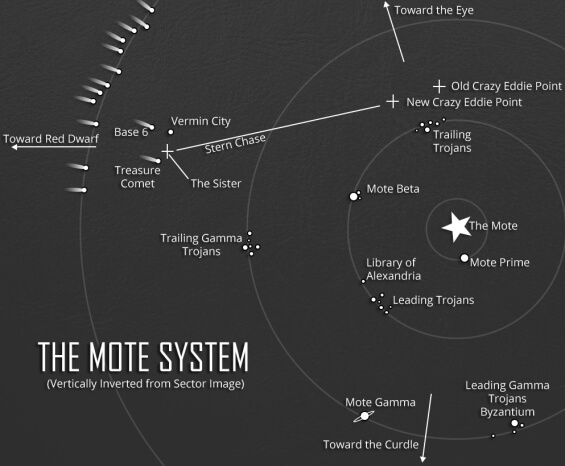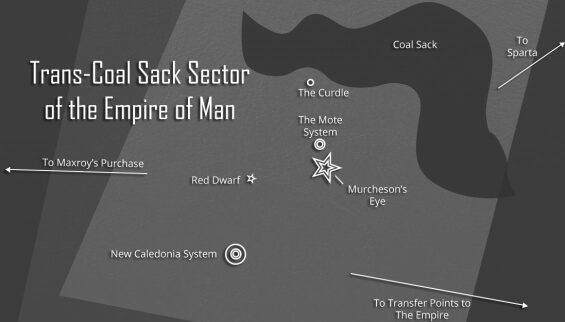
 The SFFaudio Podcast #417 – Jesse, Paul Weimer, and Maissa discuss The Gripping Hand by Larry Niven and Jerry Pournelle
The SFFaudio Podcast #417 – Jesse, Paul Weimer, and Maissa discuss The Gripping Hand by Larry Niven and Jerry Pournelle
Talked about on today’s show:
1993, a sequel to a 1974 novel, a long digression, Protector, where does Larry Niven end and Jerry Pournelle begin?, Larry Niven is the aliens, Jerry Pournelle was the humans and the military, what’s happening?, too many battles, a secret tramline, plot beats, The Mote In Gods Eye is more muscular, a second first contact, the empire is slipping, privileges vs. responsibilities, doing duty, they were shinier, WWII, the least interesting duty ever, graft, echo, the circular spiral of the Moties and the parallels with the human empire, the only difference between the Moties and the men is the differences, codicil to Horace Bury’s will, Isaac Asimov’s Foundation, too many space battles, a spacesuit full of watchmakers, kill them with fire, snow ghost, space Mormons, Reflex, A Spaceship For King David by Jerry Pournelle, the Langston field, read the Wikipedia entries before reading the books, a quasi-magic force-field, handwavium, wormhole subways gets stuff done, Babylon 5, He Fell Into A Dark Hole, kinda-sorta, feel and see the Niven Pournelle overlaps, the Janissaries novels, they’re gonna run out bullets soon, murderous centaurs, Inferno, Lucifer’s Hammer, it is interesting, a 70s disaster novel, Oath Of Fealty, Footfall, Legacy Of Herot, Fallen Angels, the Prometheus Award, anti-environmentalist, The Burning City, the Magic Goes Away universe, hit by the Niven and Pournelle hammer, Escape From Hell, sequels,
Jesse’s laws of sequels: The First Law: The second law is a sequel, and thus unneeded.
health problems, who named a planet Sauron?, too obvious, super-soldiers, military SF, war porn with laser guns, it doesn’t change the battlefield, first person shooter games, the whole point of technology is it changes things, dinosaurs, having done The Lord Of The Rings, a 2 cassette abridgement of The Gripping Hand, coffee, mispronunciations, pooping all over this book, Julie Davis, ruined the first book?, a visit to Mote Prime was missing, asteroid civilizations, the midshipman are a dead end, that’s cool!, birth control pills, the guy who invented a condom, Crazy Eddie, lifespan, tragic fatalism, bottled up, the explanation for super-conservative people, I got mine jack, it’s a fools errand…, all boondoggle, many such, 18 different levels of policing, the weed police (bylaw enforcement), just make a new agency after every crisis, anti-Greenpeace books, Cloak Of Anarchy, libertarianism is completely nuts, green crunchy granola, into that basket of deplorables, we don’t need roads, gold extraction as a proven technology, dude what are you doing?, greeners, let’s go the other way, nothing Ayn Rand ever wrote was wrong, Bury didn’t leave the bathtub, poor Kevin Renner, culinary adventure, he was the Errol Flynn of space, a girl in every port, breeding Blaines, motie rats, more Niven less Pournelle, the UK title: The Moat Around Murcheson’s Eye, mote vs. moat, more planets, helmsman full speed ahead, Sparta, the geology and topology, no map, good touches, unfair to Dr Pournelle, agricultural land reserve, mountains and islands and mountains, the Okanagan, reserving land for agricultural, the Lower Mainland of British Columbia, Coruscant is just the city world (and complete bullshit), the Fleet Of Worlds has four farming planets, almost worth reading just for such touches, why I read Science Fiction, The Mote In God’s Eye was great, the Xindi from Star Trek: Enterprise, everything in TV and movies has to be simpler, the specificity of it, totally cool, you just abstain, progress since the 1970s, lying liars, abandon all orders, in comparison to Protector, it’s all about fate, there’s very little of free will in a motie, an inescapable cycle, going crazy eddy, less well expressed, where’s our stuffed space-marine in the museum?, publisher’s deadline?, they were hot shit in the 1980s, all space battles, families taking over the legacy of their parent’s writings, firmly make this commitment, one and done Dune, use The Gripping Hand of the Protector, focus on the family, free will, Ringworld and The Ringworld Engineers, the Puppeteers, what does this mean when we maximize it?, a second stage, vs., please do not write this book Paul, seeing the world from the master’s perspective, seeing inside their brain, the x-ray laser, the time machine element, the whole idea of crazy eddy is a great idea, Invasion Of The Body Snatchers, amazing, or a crazy Bernie, fairy-duster, you must allow the bloat of the military continuously.


Posted by Jesse Willis










